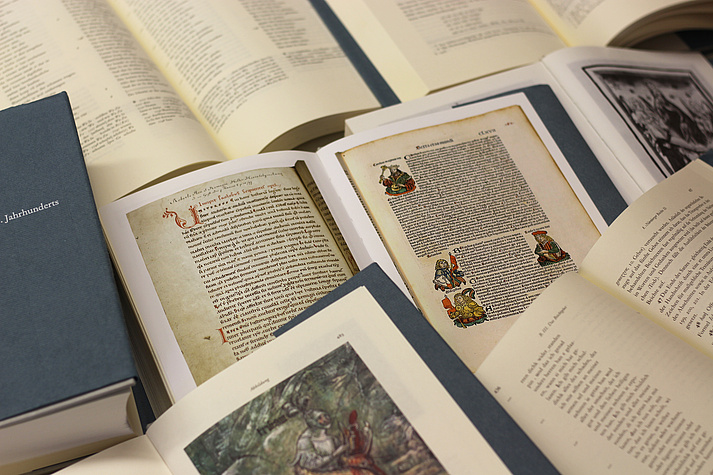German Literature of the Middle Ages
Ever since 1960, the MTU („Münchener Texte und Untersuchungen zur deutschen Literatur des Mittelalters“) has acted an accompanying series to the project „Herausgabe Deutscher Literatur des Mittelalters“ of the Bavarian Academy of Sciences. Ever since then, it has been published by the „Kommission für deutsche Literatur des Mittelalters“ (now known as the Beirat „Deutsche Literatur des Mittelalters “ ) – (i.e. the Advisory Board of „German Literature of the Middle Ages “).
Just as is the case of the research projects of the above-mentioned Commission, it is tradition history that lies at the heart of work for the series of studies produced by the MTU. This method is well established as being fundamental to research into the history of literature and to editions of German-language medieval studies. And it is continually developing (for instance. in the debate surrounding positions of New Philology). Accordingly, the MTU sees its role as one of acting as a forum for publications that distinguish themselves by concentrating on tradition history and editorial aspects as well as on theoretical reflection regarding the outcomes gained from the research.

Further research projects into German Literature of the Middle Ages
In addition to the MTU, the Advisory Board „Deutsche Literatur des Mittelalters“ (DLMA) supports several other well-regarded research projects, which likewise focus on the theme of tradition history as their approach to exploring medieval literature:
Within the framework of the project „Katalog der deutschsprachigen illustrierten Handschriften des Mittelalters“ (KdiH) the iconography of literary material of all kinds is documented in a systematic review – inasmuch as this material has been passed down in image-text-ensembles of German-language manuscripts and prints. The documentation and description of these manuscripts in the catalogue creates a working tool for scholars undertaking medieval studies to research in all relevant subject areas.
The inter-academic project „Der Österreichische Bibelübersetzer“ (ÖBÜ) is concerned with critically editing and commenting on the manuscripts of anonymous writers. Within the group of the pre-Reformation translations of the bible dating back to the14th century the works of the so-called Austrian Bible translators (Österreichische Bibelübersetzer) occupy a special place. With their „Alttestamentlichen Werk” (i.e. work on the Old Testament,) the „Evangelienwerk” and „Psalmenkommentar” (Psalm Commentary) the oeuvre of these Austrians, the Österreichische Bibelübersetzer provided translation and commentaries of a major part of bible – and that 200 years before Luther.
The series of publications by the MTU „Münchener Texte und Untersuchungen zur Literatur des Mittelalters“ has made available texts, material and genres in editions and presentations that hitherto had not been researched at all – or only insufficiently. Since 1960 more than 140 volumes have been published in the MTU series.
In addition to the above-mentioned research activities, there is the voluntary work undertaken by the project „Überlieferung der deutschsprachigen Lieddichtung des Mittelalters“, in which a central genre of medieval German literature is for the first time being reviewed systematically from the perspective of tradition history.
Work already completed includes: the dictionary Wörterbuch für mittelhochdeutsche Urkundensprache (1984 to 2009 in the academic programme Akademienprogramm) and lexicon Verfasserlexikon (1990 to 2005, which is also in the Akademienprogramm).
Further research projects in connection to the German Literature of the Middle Ages:
A book project funded by the Bavarian Academy and the Fritz Thyssen Foundation from 2018 to 2020, in which Jan-Dirk Müller examined fragments of the Nibelungenlied, was published in 2023: Varianz – die Nibelungenfragmente. Tradition and Poetics of the Nibelungenlied in the Transition from Orality to Literacy. Müller there analyses the fragments and raises fundamental questions about medieval traditions.
